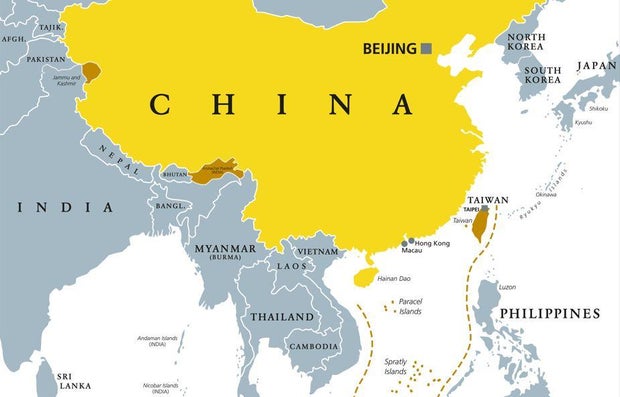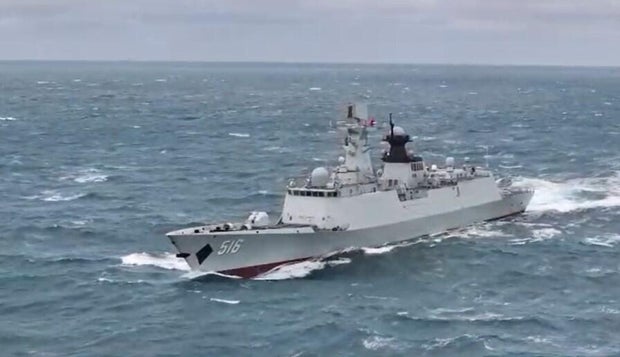Taipei — The head of the U.S. Senate Armed Services Committee said Friday he was determined the United States and Taiwan remain “the best of friends,” calling the democratic island claimed by China a “free country,” as he visited with another American lawmaker.
Republican Senators Roger Wicker and Deb Fischer arrived in Taipei on Friday for a two-day visit, as President Trump seeks to strike a trade deal with China — which insists Taiwan is part of its territory and has threatened to use force to annex it.
China’s Foreign Ministry reiterated its long-time stance in a statement issued Friday as the American senators arrived in Taipei, saying it firmly opposed any official exchanges between the U.S. and Taiwan.
“We come here from the United States bringing a message from the Congress of commitment, of long-term friendship and a determination that a free country like Taiwan absolutely has the right to remain free and preserve self-determination,” Wicker said during a news conference alongside Taiwan’s President Lai Ching-te at the presidential office, as shown in video published by the Reuters news agency.
Reuters
China’s Foreign Ministry did not immediately respond to a CBS News request for reaction to the language used by Wicker to describe Taiwan.
Before Wicker spoke in Taipei, ministry spokesperson Guo Jiakun called the U.S. delegation’s visit “a serious violation” of the one-China principle, a U.S. policy adopted decades ago that recognizes Taiwan as part of China.
Guo stressed Beijing’s stance that there is only one China, and that Taiwan is an inalienable part of China’s territory. He demanded that the U.S. abide by the one-China principle and stop “interfering in China’s internal affairs under any pretext.”
Wicker, who chairs the powerful Armed Services Committee and is a vocal supporter of Taiwan, said he and Fischer were visiting to better understand Taiwan’s needs, and they wanted to reiterate to Taiwan “our determination to remain the best of friends and to defend the freedom of everyone and both of our great countries.”
“It is our determination and our intention that Taiwan remain free and make its own decisions,” Wicker said after their talks with Lai. “Part of maintaining the freedoms that we have is enhanced cooperation militarily, enhanced cooperation with our defense industrial base, making the best use of those funds.”
Getty/iStock
Since Mr. Trump returned to the White House in January, there have been growing jitters in Taipei over the strength of the Taiwan-U.S. relationship and Washington’s willingness to defend the island if China were to attack.
Fischer said the U.S. Senate understands “the gravity of the challenges that Taiwan faces” and that a “stronger Taiwan means a stronger United States and vice versa.”
While the U.S. stopped recognizing Taiwan as an independent state in the late 1970s, in favor of China, Washington has remained Taipei’s most important backer and biggest supplier of arms that it would need to defend itself from any theoretical attack by China.
Reuters/CCTV
That support has become increasingly crucial to Taiwan in recent years, as China’s President Xi Jinping has vowed to bring the island under Beijing’s control. China has increased military pressure with large-scale exercises and routine flights and naval excursions that test the democratic island’s air and sea boundaries.
Ahead of the meeting with Wicker and Fischer, Lai said he hoped Taiwan and the U.S. would further “enhance cooperation,” and insisted the island and China were “not subordinate” to each other.
Wicker and Fischer have been travelling in the Asia-Pacific region for the past week, stopping in Hawaii, Guam, Palau and the Philippines.
U.S.-Taiwan ties have been strained since Mr. Trump took office and launched a global trade war and pressured governments in Europe and elsewhere to spend more on their own defense.
The Trump administration reportedly denied permission for Lai to transit in New York as part of a planned official trip to Latin America this month after Beijing objected. Lai reportedly then cancelled the trip.
Taiwan is also struggling to finalize a tariff deal with the U.S. after Washington imposed a temporary 20% levy that has alarmed the export-dependent island’s manufacturers.
As those negotiations continue, Lai’s government has announced plans to increase defense spending to more than 3% of GDP next year and to 5% by 2030.


